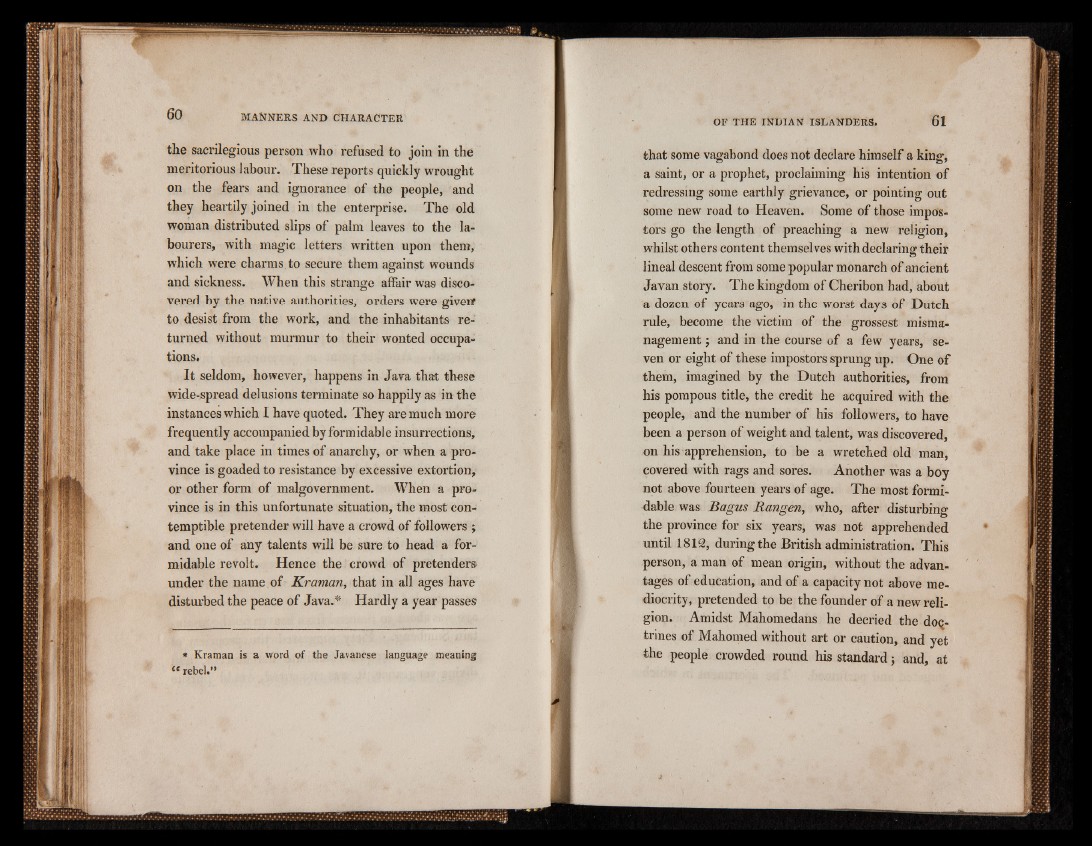
w
the sacrilegious person who refused to join in the
meritorious labour. These reports quickly wrought
on the fears and ignorance of the people, and
they heartily joined in the enterprise. The old
woman distributed slips of palm leaves to the labourers,
with magic letters written upon them,
which were charms to secure them against wounds
and sickness. When this strange affair was discovered
by the native authorities, orders were givert
to desist from the work, and the inhabitants returned
without murmur to their wonted occupations.
It seldom, however, happens in Java that these
wide-spread delusions terminate so happily as in the
instances which I have quoted. They are much more
frequently accompanied by formidable insurrections,
and take place in times of anarchy, or when a province
is goaded to resistance by excessive extortion,
or other form of malgovernment. When a province
is in this unfortunate situation, the most contemptible
pretender will have a crowd of followers ;
and one of any talents will be sure to head a formidable
revolt. Hence the crowd of pretenders
under the name of Kraman, that in all ages have
disturbed the peace of Java.* Hardly a year passes
* Kraman is a word of the Javanese language meaning
ie rebel.”
that some vagabond does not declare himself a king,
a saint, or a prophet, proclaiming his intention of
redressing some earthly grievance, or pointing out
some new road to Heaven. Some of those impostors
go the length of preaching a new religion,
whilst others content themselves with declaring their
lineal descent from some popular monarch of ancient
Javan story. The kingdom of Cheribon had, about
a dozen of years ago, in the worst days of Dutch
rule, become the victim of the grossest mismanagement
j and in the course of a few years, seven
or eight of these impostors sprung up. One of
them, imagined by the Dutch authorities, from
his pompous title, the credit lie acquired with the
people, and the number of his followers, to have
been a person of weight and talent, was discovered,
on his apprehension, to be a wretched old man,
covered with rags and sores. Another was a boy
not above fourteen years of age. The most formidable
was Bagus Rangen, who, after disturbing
the province for six years, was not apprehended
until 1812, during the British administration. This
person, a man of mean origin, without the advantages
of education, and of a capacity not above mediocrity,
pretended to be the founder of a new religion.
Amidst Mahomedans he decried the doctrines
of Mahomed without art or caution, and yet
the people crowded round his standard ; and, at